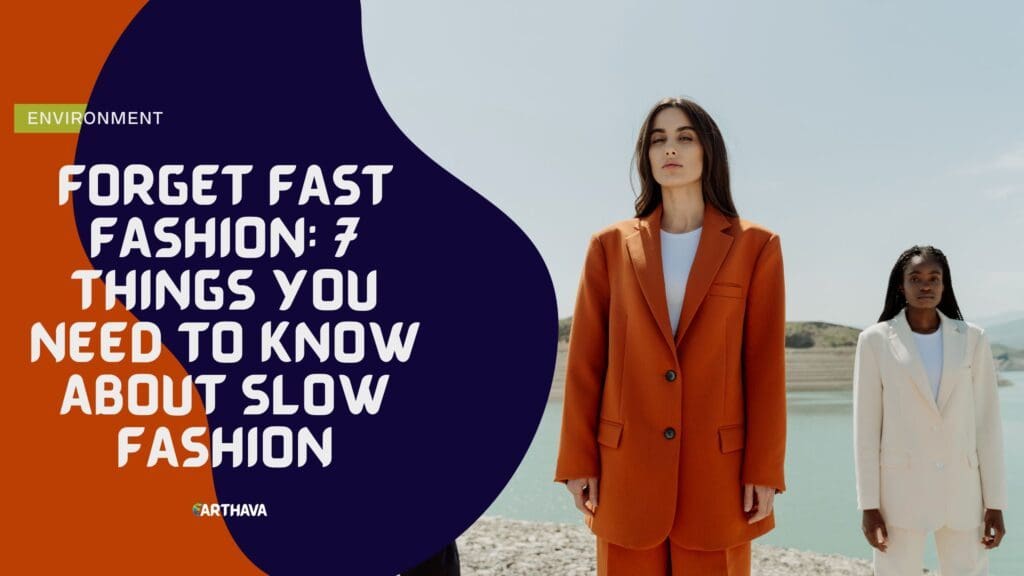Our climate has changed drastically over the past century, and 97% of climate scientists agree that human activities are the main root causes of this issue.

On a more positive note, people are starting to become aware of the impact we have on the environment, and the conversation on how we can change our behavior to minimize our ecological footprint keeps on growing.
One way we can do that is by altering the way we shop for clothes. Most of us have gotten used to shopping at fast fashion stores.
If you did, you may not even be aware of the damage the industry causes, and so you never give a second thought to the places where you buy your clothes.
We get it, but we want to change your mindset with this article. Keep reading and find out why you should make the switch from fast to slow fashion.
What’s the Problem with Fast Fashion?
When it comes to fast fashion, the goal is to constantly produce huge amounts of clothes that stores can sell for a low price.
This encourages people to buy new clothes way more often than needed and to dispose of items that are in perfect condition.
As you can imagine, this has a huge environmental and social impact:
- Each second, one garbage truck of textiles is burned or sent to a landfill
- The clothing and footwear industry is responsible for 8% of global greenhouse gas emissions
- If nothing changes, the industry’s impact on the climate is expected to grow 49% by 2030.
- More than half of the workers in the fast fashion industry aren’t paid the minimum wage
- 2,700 liters of water are used to produce one cotton shirt (to put it into perspective, that’s the amount of water you drink over 3 years)
- The fashion industry is responsible for 20% of industrial water pollution.
7 Facts About Slow Fashion
It’s clear that fast fashion isn’t doing us or our planet any good.
So, how can you stop supporting such a damaging industry, while still feeding your love for clothes and fashion? Two words: slow fashion.
Here’s why you should get on board with it:
The Materials are High Quality
Do you ever wonder how you can find clothes for such low prices in certain stores?
The truth is that you get what you pay for. There’s no such thing as longevity when it comes to fast fashion, as the fabrics are usually low quality.
On the other hand, slow fashion makes sure to use high-quality materials, for each piece to last long.
You may have to spend a little bit more on slow-fashion pieces, but you won’t have to replace them as often. In the end, your wallet will thank you.
The Materials and Production Process are Sustainable
If the process of making slow fashion clothes wasn’t eco-friendly, its whole purpose would be destroyed.
Slow fashion works to minimize the impact of the industry and to fight against the statistics we mentioned before.
To do so, it uses natural fabrics, avoids the use of harsh chemicals and employs ethical practices that don’t pollute as much as fast fashion.
Slow Fashion Helps Build a Community
Slow fashion is about local just as much as it is about global.
It’s meant to foster a conversation around what’s now the biggest issue that human beings face, whether that conversation is between friends and family or between the owners of the biggest fashion brands on Earth.
Plus, anyone who gets involved in this industry has a bigger, deeper goal than just being fashionable. That alone makes it feel like a community.
New Collections Aren’t Released As Often
Unlike what happens with fast fashion, slow fashion doesn’t mean to encourage overconsumption. Instead, the goal is to promote a more conscious consumer behavior.
Since clothing is produced to last, there’s no need for new collections to be released as often as they are in fast fashion.
Slow Fashion Workers Are Fairly Paid and Treated
Besides the materials, another reason why you find such cheap clothes at fast fashion stores is that those who make the items are incredibly underpaid.
Furthermore, the working conditions are usually not the best.
Slow Fashion recognizes the hard work of its workers and prides itself on being a fair industry.
This means that when you buy an ethical piece of clothing, you don’t have to worry about the people who worked for you to have it.
There’s a Story Behind Every Slow Fashion Brand
If you visit any slow fashion brand’s website, you’ll see that it’s not all about sales.
You’ll find that these kinds of brands want to tell a story. About where they come from, why slow fashion matters, who are the producers of their pieces, how you can do your part, and more.
For slow fashion brands, spreading the message is just as important as selling.
It’s Still Fashionable
As much as we care about the environment, in the end, we’re still talking about fashion.
Like Kelly Drennan, the founding executive director of Fashion Takes Action said in an interview for Global News,
We often talk about the fact that if a garment is ugly, it doesn’t matter how it’s made because it won’t sell.
So if you love the idea of slow fashion but were worried you wouldn’t find clothes to match your style… there’s nothing to worry about.
Join the Slow Fashion Movement
Whether we like it or not, we all need to change our habits and become kinder to our planet.
As you read, there’s no reason why you shouldn’t give slow fashion a try. It’s not just beneficial to the environment, but also to the workers and to yourself!


